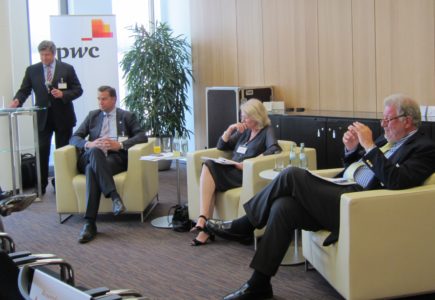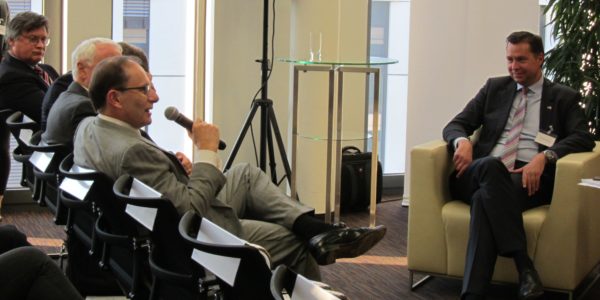
The European Union needs to reform. Whether or not the British EU referendum on June 23 ends with Britain leaving the EU or staying in, Brussels will fundamentally have to change the way it does business. “Even if the British vote “Yes” to EU membership, the debate will continue,” said Stephan Mayer, member of the Bundestag and head of the British-German parliamentary group, “Whoever thinks that the issue will be closed then, really is wrong. The EU needs to change.”
Mayer was speaking at a debating evening on June 6 in Berlin organised jointly by United Europe, the Deutsch-Britische Gesellschaft and the Young Königswinter Alumni. With less than three weeks to go until the British referendum, the topic was “Britain’s Choice, Europe’s Destiny”.
The event was generously hosted by PricewaterhouseCoopers in their new office rooms in the centre of Berlin. PwC Partner Lutz Roschker reminded participants of the importance of history and Winston Churchill’s 1946 speech on Europe. With around 50 mostly young people in the audience, the concern over a potential Brexit and its consequences for Britain and the rest of Europe was palpable.
The end of stag nights on the continent?

Much of the discussion centred on how the British – in particular the younger, more European generation – could still be convinced to vote for EU membership. Jürgen Grossmann, founder of United Europe and honorary president of the Deutsch-Britische Gesellschaft, who was on the panel with Stephan Mayer, pointed out that new arguments were needed.
“To say that European integration safeguards the peace in Europe cannot be our only argument,” Grossmann said. “And while it is helpful to speak about benefits for the economy, that argument is not one hundred percent sufficient either. I think we will need to argue that Europe is needed to defend our way of life and our culture.”
Alison Smale, chief correspondent for the New York Times for Germany, Central and Eastern Europe, who was moderating the debate, put forward some very pragmatic suggestions for winning over young voters. “You have to tell them that EU membership is about being able to study in Europe, about traveling without a visa, about getting on Easyjet for a weekend trip,” Smale said, who is British herself and has a daughter living in the UK. “Tell them that if Brexit happens, they might not be able to celebrate their stag night on the continent.”

Yet not everybody in the audience was totally against Brexit; for instance John Jetter, a member of United Europe with both German and Australian citizenship, spoke about the good it might bring about. “I am a passionate European,” Jetter said. “But Europe seems to be less and less able to reform. Perhaps it needs an existential crisis in order to change. Perhaps Brexit is needed to engender such a crisis.”
Not very optimistic
On Jetter’s call for reform, the panel agreed. On his hopes for Brexit, it didn’t. “There is a huge gap between Europe’s citizens and the European elites that is caused by a lack of subsidiarity and transparency of European decisions,” Stephan Mayer said. “But can much-needed reforms be brought about by a catastrophic event like Brexit? I’m not so sure.”
In a similar tone, Jürgen Grossmann warned against harbouring illusions. “Sow the wind and reap the whirlwind,” he said. “A crisis could very quickly get out of hand. We shouldn’t destroy Europe in order to rebuild it.”
It was on this note that the debate ended – an interesting if not very optimistic discussion of Britain in or out of Europe, and the consequences of such a far-reaching decision.


